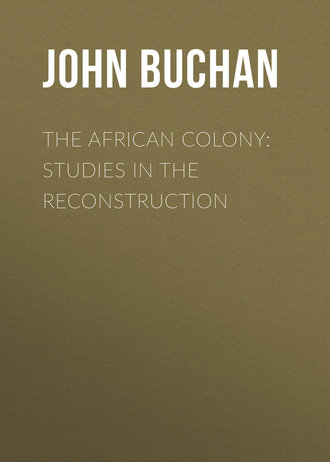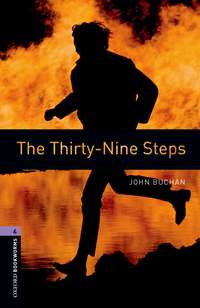 полная версия
полная версияThe African Colony: Studies in the Reconstruction
Hereabouts, when my ship comes home, I shall have my country house. There is a piece of flat land, perhaps six acres square, from which a long glen runs down to the Letaba. There I shall have my dwelling. In front there will be a park to put England to shame, miles of rolling green dotted with shapely woods, and in the centre a broad glade in which a salmon-river flows in shallows and falls among tree-ferns, arums, and bracken. There may be a lake, but I am undecided. In front I shall have a flower-garden, where every temperate and tropical blossom will appear, and in a sheltered hollow an orchard of deciduous trees, and an orange plantation. Highland cattle, imported at incredible expense, will roam on the hillsides. My back windows will look down 4000 feet on the tropics, my front on the long meadow vista with the Iron Crown mountain for the sun to set behind. My house will be long and low, with broad wings, built of good stone and whitewashed, with a thatched roof and green shutters, so that it will resemble a prazo such as some Portuguese seigneur might have dwelt in in old times. Within it will be cool and fresh, with stone floors and big fireplaces, for the mists are chill and the winds can blow sharply on the mountains. There will be good pictures and books, and quantities of horns and skins. I shall grow my own supplies, and make my own wine and tobacco. Rides will be cut in the woods, and when my friends come to stay we shall drive bushbuck and pig, and stalk tiger-cats in the forest. There will be wildfowl on my lake, and Lochleven trout in my waters. And whoever cares to sail 5000 miles, and travel 1500 by train, and drive 50 over a rough road, will find at the end of his journey such a palace as Kubla Khan never dreamed of. The accomplishment is difficult, but not, I trust, impossible. Once upon a time, as the story goes, a Dutchman talked with a predikant about the welfare of his soul. “You will assuredly be damned,” said the predikant, “and burn in hell.” “Not so,” said the Dutchman. “If I am so unfortunate as to get in there, I shall certainly get out again.” “But that is folly and an impossibility,” said the predikant. “Ah,” said the other with confidence, “wait and see: I shall make a plan.” Ek sal ’n plan maak– this must be my motto, and I shall gratefully accept all honourable suggestions.
The country is full of wealth – mines, agriculture, forestry, and pasturage. The presence of payable gold, both in quartz and banket, is undoubted, and some improvement in the roads, possibly a light railway, and the completion of the Selati line may provide for the rise of Haenertsburg from a very little dorp into a flourishing township. There is magnificent pasturage for stock, for cattle diseases are few and horse-sickness is unknown. It has been said that one acre in the Wood Bush will carry an ox, and though this is an exaggeration, it is certain that the rich herbage will maintain three or four times the head of stock which can be run on the high veld. The grass in spring is very early, and in the worst part of winter the forests can be resorted to, so that hand-feeding is almost unknown. The grass is sour veld, but any extensive pasturing would soon bring it into the sweet veld class. Once it were properly grazed down, it would be also a natural sheep country of high value. The soil is a clayey red loam, and the moist climate provides perfect conditions for most seed crops. Tobacco would thrive well – as well perhaps as on the lower slopes along the Groot Letaba, where Mr Altenroxel produces excellent pipe tobacco and a respectable cigar. It is a paradise for vegetables, and all hardy fruits and a few sub-tropical ones could be made to flourish in the rich straths. It is a land for small holdings, save for a few larger farms on the hill-tops, and here might arise a community of British settlers, making a new England out of a country which already possesses the climate of the West Highlands and the configuration of a Sussex park.
At Skellum Kloof we descended from the uplands to an elevation of about 2000 feet, a type of scenery half-way between the wholesome high veld and the pernicious flats of the Lower Letaba. I take that descent to be all but the worst in the Transvaal, second only to the appalling cliff over which the road from Lydenburg drops to the Olifants. The grades are so steep that with a waggon it is necessary to outspan all animals but the two wheelers, and lock the wheels tightly. With a two-wheeled Cape cart to attempt it is to court destruction. Just at the foot is an awesome corner, and then a straight slope to the Letaba, a stream about the size of the Spean and not unlike it. There is a fine salmon pool below the ford, in which I swam circumspectly, being in dread of stray crocodiles. The valley has nothing of that raw unfinished look so common in South African landscapes. The peaks rise in noble contours from long stretches of forest and Kaffir tillage. As we crossed, the mist drooped over the hills and we ascended the far side to our camp in a heavy persistent rain. The whole country was full of crying waters, and but for the clumps of wild bananas and the indescribable African smell, we might have been climbing to a Norwegian saeter after a long day’s fishing.
All night it rained in torrents, and next morning – New Year’s Day – dawned in the same driving misty weather. We could not see twenty yards, and the long sloppy grass and thick red mud of the roads made bad going even for Afrikander ponies. We sent our heavy transport back, and, carrying little more than a dry shirt and a toothbrush, struck down a track which follows the eastern ridge of the valley. The vegetation was as dense as any jungle, and swishing through the reeds and ducking the low branches of trees soaked us to the skin in a few minutes. But in spite of discomfort it was a fascinating ride. The heavy tropical scents which the rain brought out of the ground, the intense silence of the drooping mists and water-laden forests, the clusters of beehive Kaffir huts in the hollows, all made up a world strange and new to the sight and yet familiar to the imagination. This was the old Africa of a boy’s dream, and there is no keener delight than to realise an impression of childhood. Yet, though the air blew sharp, there was something unwholesome in it. Fever lurked in the comely glens, and the clear reaches of the Letaba were not the honest, if scanty, waters of the high veld. The pungent penetrating smell of the herbs we trod underfoot had an uncanniness in it as if all were simples and antidotes – a faint medicinal flavour like the ante-chamber of a physician.
Krabbefontein, which we reached at mid-day, is a very beautiful clearing in the woods on the left bank of the river and at the foot of the Machubi glen. Mr Altenroxel, the owner, farms on a large scale, and has long been famous for his tropical produce. The luxuriance of the growth is so great as almost to pass belief. Gum-trees grow from 10 to 15 feet in a year; and we saw a bamboo fully 50 feet high whose age was under two years. Huge drying-sheds for tobacco, numerous well-built outhouses and cottages, wholly the work of natives, and a few rondhavels made up the farm-steading. The time was past for apricots, but the orchard was full of grenadillas, finest of South African fruit, and kei apples; grapes were plentiful; and in a field of pines we destroyed the remnants of our digestion. The owner remained on his farm throughout the war, growing his own supplies, which included tea, sugar, and coffee. His tobacco is the finest brand of Transvaal pipe-tobacco I have smoked, and he exports to the towns boxes of light-flavoured but pleasant cigars, making everything on the farm except the labels. I have rarely seen native workers so intelligent and industrious, and the whole place leaves an impression of strenuous and enlightened toil. In the bungalow we ate our New Year’s dinner, washed down by excellent German beer, carried many miles across the hills. If the conversation at table approached the domain of fact at all, the neighbourhood is full of uncanny things. A disgusting variety of tarantula, whose bite means death in half an hour, has his home around the tobacco-sheds; puff-adders abound; and the week before our visit a black mamba had attacked and killed a young Dutch girl. We heard, too, many tales of the eastern hunting-veld, and in the huge dark spaces beyond the rafters we saw the shadowy trophies of former hunting trips.
At daybreak next morning, in a thick drizzle, we started to reascend the mountains. A Kaffir set us on our way, and soon the hills closed in and we were in the long glen of Machubi. Machubi was a Kaffir chief with whom the Boers waged one of their many and most inglorious little wars. When his people were scattered he took refuge in the thick forest at the head of the river which bears his name. After my experience of that kind of forest I do not wonder that the Boers preferred not to fight a hand-to-hand battle in its tangled depths. So, after their fashion, they hired an impi of Swazis, who sat around the wood for three weeks, and ultimately slew the chief – not, however, before he had accounted in single-handed combat for three of his enemies. Mr Altenroxel possesses the old warrior’s skull, which, except for the great thickness at the crown of the head, is finely shaped, and all but Caucasian in its lines. For this glen of Machubi I have nothing but praise: high bush-clad mountains, grey corries, streaked with white waterfalls, a limpid hill-stream, and in the flats green patches of Kaffir tillage. But the road – which once was a coach-road! – is pure farce. If there is a peculiarly tangled piece of scrub it dives into it, a really awkward rock and it ascends it, an unfordable reach of an easy stream and it makes straight for it, a swamp and it leads you into the deepest and direst part. We had constantly to dismount and coax our ponies down and up impossible steeps. My little African stallion as a rock-climber was not at his best, and I had some awkward positions to get him out of. One in particular remains in my memory. A very deep river could only be crossed by standing on a stone, leaping to an old log, and thence with a final sprawl to the farther bank. I turned my reins into a halter, went in front, and tried to coax my pony. When at last he did it he all but landed on my chest, and I made the acquaintance of the hardness of every one of his bones before I got him out of the valley.
The road climbs a spur in the fork of two streams, and as one ascends and looks up the narrow twin glens, the old exquisite green of the true Wood Bush takes the place of the sadder colours of the lowlands. The heads of the glens have the form of what are called in the north of England and Scotland “hopes,” rounded green cup-shaped hollows; only here all things are on a larger scale, and the evergreen forest takes the place of birch and juniper in the corries. The road wound through wood and bracken, now coming out clear on a knoll, and now sinking to the level of some little stream. The mist which had covered the mountains was clearing, and one after another the green summits came forth like jewels against the pale morning sky. The tropical scents ceased, the sun shone out, and suddenly we were on the neck of the pass with a meadow-land country falling away from our feet. It was still hazy, but as we breakfasted the foreground slowly cleared. Little white roads sped away over the shoulders of hill; a rushing stream appeared in a hollow with one noble waterfall. Still the landscape opened; wood after wood came into being, glistening like emeralds in the dawn; long sweeps of pasture, each with its glimpse of water, carried the eye to where the great Drakensberg, blue and distant, was emerging from the fleecy mists of morning. Once more we were in the enchanted garden-land.
It is easy to describe the awesome and the immense, but it is hard indeed to convey an adequate impression of exceeding charm and richness. Hard, at least, in dull prose. A line of gleaming poetry, such as Herrick’s —
“Here in green meadows sits Eternal May,”or Theocritus’s —
πάντ’ ὦσδεν θέρεος μάλα πίονος ὦσδε δ’ ὀπώρας,will convey more of the true and intimate charm than folios of elaborated description. The main feature of the place is its sharp distinction from the common South African landscape. The high veld with its vast spaces, the noble mountain ravines, the flats of the bush veld, have all their own charm; but the traveller is plagued with the something unfriendly and austere in their air, as if all thought of human life had been wanting in their creation. They are built on a scale other than ours; man’s labour has in the last resort no power to change them. They remain rough, unfinished, eternally strange, a country to admire, but scarcely to adopt and understand. But this garden-ground is wholly human. Natura Benigna was the goddess who presided at its creation, and no roughness enters into the “warm, green-muffled” slopes, the moist temperate weather, and the limpid waters. It is England, richer, softer, kindlier, a vast demesne laid out as no landscape gardener could ever contrive, waiting for a human life worthy of such an environment. But it is more – it is that most fascinating of all types of scenery, a garden on the edge of a wilderness. And such a wilderness! Over the brink of the meadow, four thousand feet down, stretch the steaming fever flats. From a cool fresh lawn you look clear over a hundred miles of nameless savagery. The first contrast which fascinates the traveller is between the common veld and this garden; but the deeper contrast, which is a perpetual delight to the dweller, is between his temperate home and the rude wilds beyond his park wall.
What is to be the fate of it? There is no reason why it should not become at once a closely settled farming country. If the Pietersburg line is looped round between Magatoland and the Spelonken and brought south to meet a line from Leydsdorp, this intervening plateau will have a ready access to markets. The place, too, may become a famous sanatorium, to which the worried town-dwellers may retire to recover health from the quiet greenery. Country houses may spring up, and what is now the preserve of a few enthusiasts may become in time the Simla or Saratoga of the Transvaal. How much, I wonder, will the new-comers see of its manifold graces? Any one can appreciate the mellow air, the restful water-meadows, the profound stillness of the deep-bosomed hills. These are physical matters, making a direct appeal to the simpler senses. But for the rest? It is the place for youth, youth with high spirit and wide horizon, sensitive to scenery and weather, loving wild nature and adventure for their own noble sakes. How much, I wonder, will they see of it all – the people who have the purse to compass health resorts and the constitutions to need them? For here, as in all places of subtle and profound beauty, there is need of the seeing eye and the understanding heart.
“We receive but what we give,And in our life alone does Nature live;Ours is her wedding garment, ours her shroud!And would we aught behold of higher worthThan that inanimate cold world allowedTo the poor loveless, ever-anxious crowd,Ah! from the soul itself must issue forthA light, a glory, a fair luminous cloudEnveloping the earth.”I do not think that the place will ever become staled. The special correspondent will not rhapsodise over it – he will find many places better worthy of his genius; the voice of the halfpenny paper will not, I think, be heard in that land. Its appeal is at once too obvious and too subtle: too obvious in its main features to please the common connoisseur, too subtle and remote for the wayfaring man to penetrate. It will remain, I trust, the paradise of a few – a paradise none the less their own because towns and hotels and country houses may have sprung up throughout it. To such it will always appear (as it appeared to us when we took farewell of it from the summit above Haenertsburg and saw the hills and glades sleeping in the mellow afternoon) an old-world Arcadia, a lost classic land which Nature with her artist’s humour has created in this raw unstoried Africa.
December 1902-January 1903.
CHAPTER IX.
ON THE EASTERN VELD
Machadodorp, that straggling village called after a Portuguese commander, is the most easterly outpost of the high veld. A few miles farther and there is a sheer fall into narrow mountain glens, down which the Elands River and the Delagoa Bay Railway make the best of their way to the lowlands. North lies the hill country of Lydenburg, to which the traveller may come in a coach after a day of heart-breaking hills and neck-breaking descents. But south for a good hundred miles sweeps the high veld in a broad promontory from Machadodorp to the Pongola, and on the east to the Swaziland border. It is the highest part of the great central tableland, and a very bleak dwelling-place in winter; but in summer and autumn it has a full share of the curious veld beauty. In particular, being in the line of the Drakensberg, you can come to its edge and look over into the wild tangle of glens which lie between you and the Lebombo hills. Also it is the lake district of South Africa, being full of tarns of all sizes from Lake Chrissie, which is a respectable sheet of water, to the tiniest reed-filled pan. It is the coldest, freshest, and windiest part of the land, a tonic country where the inhabitants are rarely ill, and few doctors can make a living.
The journey to the first outspan from Machadodorp on the Ermelo road is a little monotonous, for you are not yet on the ridge of the high veld, the grass is rank, and the landscape featureless. You are pursued, too, by an unfinished railway, the Machadodorp-Carolina line, and if there is an uglier thing than the raw scar made by earthworks and excavations and uncompleted culverts, I do not know it. The line is being taken over by Government, and the sooner it is laid the better, for at present the richest farming population in the Transvaal are some sixty miles from a rail-head. At the fine stone bridge of the Komati you enter a more pleasing country, with a glimpse to the east of a gap in the hills through which the river enters the broken country. The Komati here is a slow high-veld stream creeping through long muddy pools with the slenderest of currents, but some eight miles down it is a hill torrent. This is one of the paradoxes of the high-veld rivers. Elsewhere it is in their cradle that streams have their “bright speed”; here the infant river must be content to creep like a canal, and lo! when it is almost full grown, it finds itself hurled in cataracts down a mountain valley. Who, seeing the Olifants near Middelburg, can ever believe that it is the same stream which swirls round a corner of the berg north of Ohrigstad; or, watching the sluggish Umpilusi crawling through the high veld, find any kinship between it and the Swaziland salmon-river? It is a romantic career – first a chain of half-stagnant pools, then a cataract, and then a full-grown river, rolling its yellow waters through leagues of bush and jungle to the tropical ocean.
From Everard’s store, which is a pleasant outspan among trees, the road climbs steeply to the ridge of the country. A tremendous sweep of veld comes into view, stretching to the west in hazy leagues till the eyes dazzle with the soft contours and infinite lines, and in the east barred at a great distance by a faint blue range, the Ingwenya Mountains. The first pan appeared, no larger than an English mill-dam, and overgrown with reeds which made a patch of darker green against the veld. One had the sensation of being somewhere on the roof of the world, for on every horizon but one the land sloped to a lower altitude, and even on the east the mountains seemed foreshortened, like the masts of a vessel just coming into sight at sea. Presently a little white dorp, Carolina, appeared some miles away on the left, with that curious look of a Pilgrim’s Progress village which so many veld townships possess. Then miles on miles of the same green downland, the road now sinking into little valleys with a glimpse of farm-steadings, and now holding the ridge in the centre of the amphitheatre. As the autumn evening fell, and the soft lights bathed the landscape, it became a spectral world, a Tir-an-Oig, in which it was difficult to believe that this rose-coloured slope was not a dream or that purple clump of trees a mirage. Little lochs appeared, some olive-green with rushes, some cold and black with inky waves lapping on dazzling white shores. Water, in Novalis’ quaint fancy, is as the eye to a landscape, the one thing generally lacking in the blind infinity of the veld. Strings of wild-geese passed over our heads, and from the meadow bottoms there came the call of ducks and now and then the bark of a korhaan. Curious echoes arose as we passed, for there is something in the geological structure of the country which makes it full of eerie noises. And then, as darkness closed down, a long piece of water appeared, beyond which rose a little hill with two woods of blue gum and a light between them. A nearer view showed a trim cottage, with Kaffir huts around it, the beginnings of a garden, and, even in the dusk, a glimpse of long lines of crops stretching down to the lake. It was the homestead of Florence, which stands on the apex of a large block of Crown land, and is used as the headquarters of the land commissioner of the eastern district.
From Florence to the Swaziland border is some fifty miles as the crow flies, so at dawn our horses were saddled, and, with a mule-cart for provisions, we set out towards the remote hills. The morning had begun in a Scots mist, but by ten o’clock the sky was cloudless, and the intense blue of the lakes, the white shores, and the many patches of marl on the slopes caught the sun with a bewildering glare. The water in the pans is generally brackish, but some few are fresh, and one in particular, about four miles long, has wooded islets and a bold white bluff like a chalk cliff. The names are mostly Scots – Blairmore, Ardentinny, Hamilton, – for the land was first bought and settled by a Glasgow company. They are almost all stock farms, with little irrigation except along the Umpilusi; and many are fenced, efficiently enough, with slabs of stone for uprights. On one farm, Lake Banagher, we rode past a herd of some 300 or 400 blesbok and springbok, which are preserved by Mr Schalk Meyer, the owner. About noon we came into the shallow vale of the Umpilusi, and left it again for a high ridge, whence all afternoon we had a view of rolling country to the south, with the Slaangaapies mountains on the horizon. The great hills in the north of Swaziland were faint but clear, though we were still too high ourselves to see them to advantage. The country began to change, the valleys became almost glens, a great deal of tumbled rock appeared overgrown with bush and bracken, and everything spoke of the beginnings of a mountain country, which, strangely enough, we were approaching from above. In the late afternoon we came to large belts of trees around a ruined farmhouse, and as the sky was beginning to threaten we outspanned for the night. We were not more than half a dozen miles from the Swazi border and in full sight of it – a chain of little kopjes with a hint of faint mountains behind.
The farmhouse was an odd place seen in that stormy dusk. Thick woods of blue-gum and pine surrounded it, and below, also hemmed in by trees, was a lush water-meadow. The house had been a substantial stone building, but it was stripped to the walls, every scrap of woodwork having been used by the troops for fuel. The broken stoep was overgrown with moon-flowers, whose huge white blossoms gleamed uncannily in the shadows. We pushed through the wood and the overgrown paddock to a neglected orchard, where the fruit-trees had lost all semblance of their former selves, and struggled vainly among creepers and high grasses, and thence to the meadow where a little reddish stream trickled through the undergrowth. Owls flitted about like the ghosts of the place, and this relic of war with its moated-grange melancholy had a depressing effect on our spirits. We gladly sought our camp in an old barn on higher ground, where a blazing fire restored us to cheerfulness. The rain never fell, and the morning dawned grey and misty, so that when we set out for the border we had little hope of a view. We passed some Swazi kraals, and got directions from their picturesque occupants. The men are active and tall, and their wives with their curious head-dresses are better to look at than the sluttish native women of the central districts. They are beautiful dancers, and the performance of a body of Swazis in war costume is a thing to remember. The country began to be extremely rocky, and tree-ferns and other specimens of sub-tropical vegetation appeared in the hollows. One glossy-leaved bush bore a berry about the size and shape of a rasp, called by the natives “infanfaan,” which had an agreeable sub-acid flavour. A little hill, looking as if it were made of one single gigantic boulder, appeared on the right, and with some scrambling we got our horses to the foot of it. This was Bell’s Kop, a famous landmark, and beyond and below was Swaziland.









